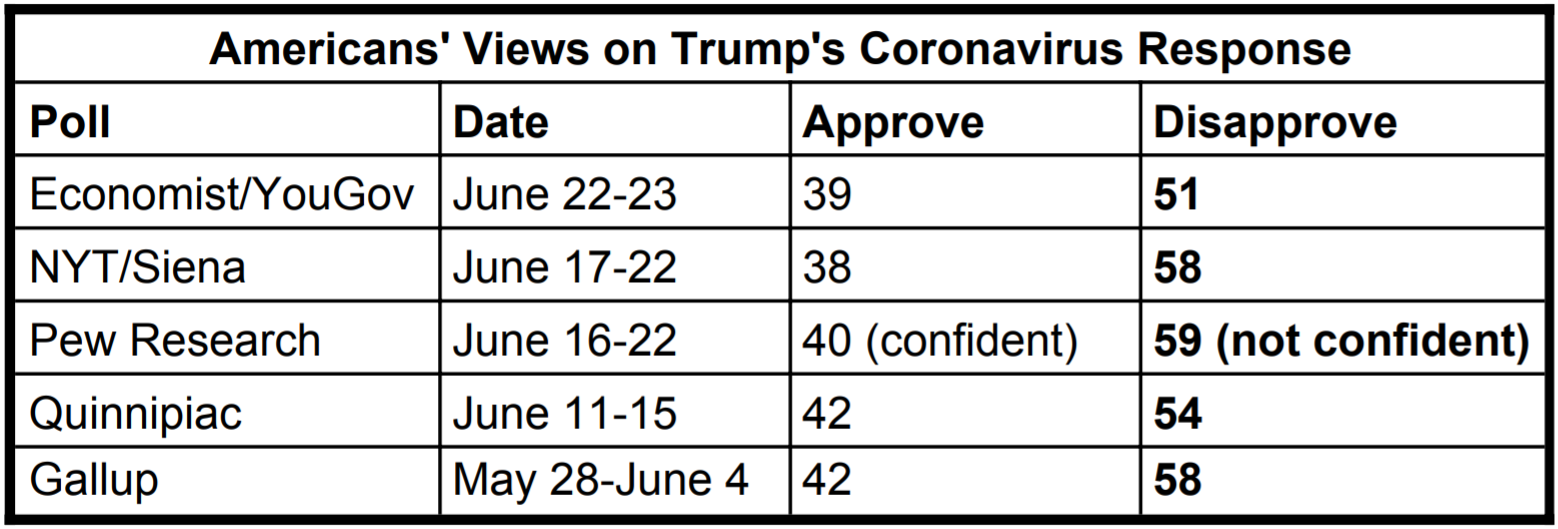The Russian Bounty Story is Not the Reset the Trump Campaign Needs
July 1, 2020 · 11:07 AM EDT
While President Donald Trump’s re-election is at its most precarious point yet, another hot issue is moving into the conversation which could delay or prevent him from regaining his footing.
Trump has slipped significantly in the polls, both nationwide and in crucial swing states, against former vice president Joe Biden, and he suffered an embarrassing setback when a Tulsa, Okla. rally that was supposed to reignite the campaign drew a far smaller crowd than expected.

Contributing to the president’s decline are the coronavirus pandemic and the national reckoning on racism in the wake of the death of George Floyd while in police custody. The American public disapproves of Trump’s handling of both of those issues, according to recent polling, and largely believes that Biden would be more adept at addressing those twin challenges.
After a brief period of positivity, views of Trump’s handling of coronavirus have stabilized at a disadvantage to the incumbent. According to a June 11-15 poll of registered voters by Quinnipiac Univ., 42 percent approved of the president’s handling of the issue compared to 56 percent who disapproved and 54 percent of voters who thought Biden would do better on the issue. Similarly New York Times/Siena (June 17-22) found 38 percent approved of Trump’s handling of coronavirus vs. 58 percent who disapproved, Gallup (May 28-June 4) found 42 percent approved/58 percent disapproved, and CNBC (June 19-22) found voters preferred Biden on the issue 46 percent to 32 percent.
Trump’s job rating on race issues is even worse. NYT/Siena clocked his approval on race relations at 33 percent approve/61 percent disapprove. Quinnipiac found him at 36 percent approve/59 percent disapprove, and that voters preferred Biden on race relations by a 58-36 percent margin. The Economist/YouGov (June 21-23) found that just 37 percent of voters approved of Trump’s handling of the protests, while 55 percent disapproved, and CNBC found that Biden led Trump by 25 points on issues of racial equality, and 12 points on issues of police reform and criminal justice.
Now, a third issue could threaten to derail the president further: reporting on a bounty program run by Russian intelligence that awarded the Taliban for killing American troops.
The president is no stranger to Russia-related controversies, and while the electoral impact of the Mueller investigation and impeachment over the Ukraine phone call will likely be minimal, there’s reason to believe that this one might be different. The news’ proximity to the election, as well as the fact that it reportedly involves the deaths of servicemembers, could make it more salient.
If the bounty story -- which surfaced just this weekend -- does gain traction, it will be another instance of the president confronted with an issue that does not play to his strengths.
The CNBC poll from June 19-22 cuts to the chase: when asked who they thought would be better on foreign policy and world leadership, voters chose Biden by a 13-point margin, 48-35 percent. In a USA Today/Suffolk Univ. (June 16-22) survey, voters chose Biden over Trump 52-40 percent on the issue of national security.
Voters’ unease with Trump on foreign policy was also reflected in the Gallup poll taken May 28-June 4, in which 41 percent approved of the president’s handling of foreign affairs while 58 percent disapproved, and in the YouGov poll from June 21-23 that found just 35 percent of voters were confident in Trump’s ability to deal wisely with an international crisis, while 51 percent were uneasy about his approach. (The president did score slightly higher in a May 8-10 Morning Consult survey, which had his foreign policy approval/disapproval at 41-45 percent.)
And Quinnipiac (June 11-15) found that voters disapproved of Trump’s handling of the military 44-52 percent.
That poll also asked voters who they thought would better handle a crisis; Biden led 54-43 percent.
The Russia bounty story does not rise to the level of crisis, at least not yet, but the allegations are serious enough that it is forcing GOP elected officials to respond, which will keep the issue in the news. At a minimum, the story will delay the president’s attempts to refocus on the economy.
For a campaign desperately hoping for a narrative-shifting moment to claw back to a tight race, there’s no guarantee that a persistent national security story will help the president, and significant danger that it could hurt him further.